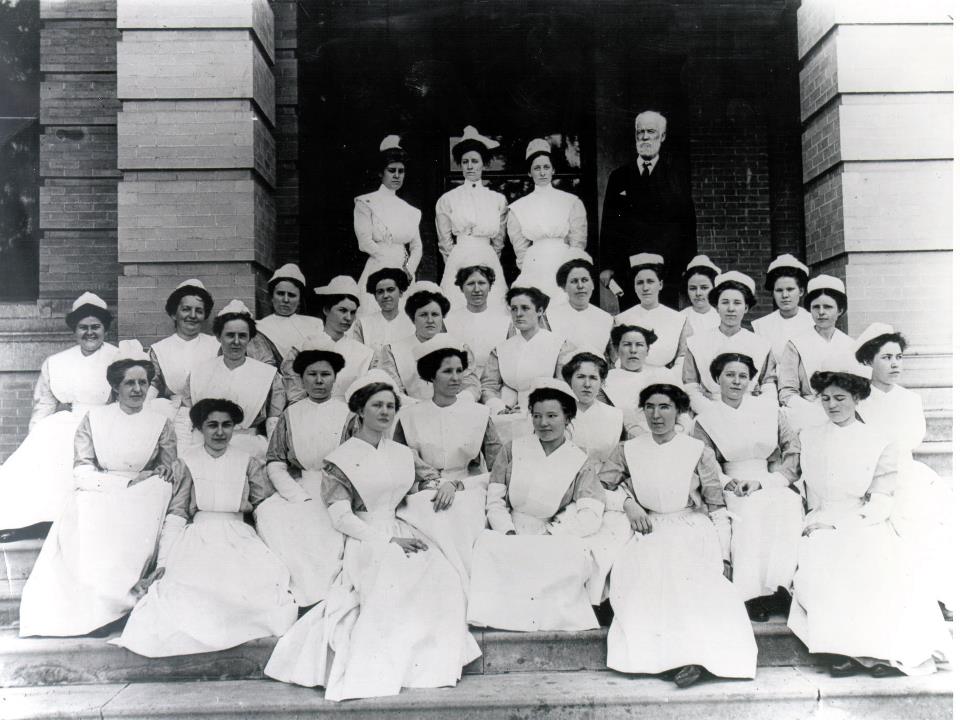
Opinions differ as to the circumstances under which women, who were not nuns, began to work as nurses. According to one version, the initiator was the surgeon Nikolai Pirogov during the Sevastopol defense of 1854. The besieged city was overflowing with wounded, and the surgeon realized that doctors alone could not cope with this. He created the profession of a nurse, which at that time were girls from high society. They volunteered for the nursing service. They only worked for food, clothing and housing.
According to another version, Florence Nightingale, who actively participated in the Crimean campaign of 1854, working in field hospitals as a nurse, became the founder and main popularizer of the work of a nurse. Together with 38 assistants, she implemented the principles of sanitation and care of the wounded, thanks to which, in less than six months, mortality in infirmaries decreased from 42% to 2.2%.
Later, when foreigners declared the Englishwoman Nightingale the organizer of the world’s first nursing service, Pirogov wrote that the Exaltation of the Cross Community of Sisters of Care for the Wounded and Sick was established in October 1854, and in November of the same year she was already at the front. And he heard about Miss Nightingale only at the beginning of 1855.
War, plague, mercy
In 1912, the Florence Nightingale Medal was instituted, which is still the most honorable award for sisters of mercy around the world. Florence Nightingale could reorganize the army medical service and popularize the work of nurses. It is on her birthday – May 12 – that the International Day of the Nurse is celebrated.
Nurse Day is celebrated since the unification of sisters of mercy from 141 countries into a professional public organization – the International Council of Nurses.
Another famous nurse during the Crimean War was Mary Jane Sicol. She learned herbal medicine and folk medicine from her mother, and also wanted to volunteer as a nurse during the Crimean War. Mary Seacall borrowed money to travel 6,500 km and became famous for helping the injured on both sides right under fire.
But the nursing story began long before the exploits of Florence Nightingale and Mary Jane Sicol.
As early as the 11th century, communities of women were created in the cities of Western Europe, whose tasks included caring for the sick. In the 13th century, Countess Elizabeth of Thuringia built a hospital, in which she herself worked a lot. She was canonized, and a Catholic community of “Elizabethan women” was founded in her honor. In peacetime, the sisters looked after only sick women, and in wartime – and for men.
The same activity was carried out by the community of “Joanites”, whose work was especially noticeable in Paris during the 1348 plague epidemic.
In 1617, in France, the priest Vincent Paul organized the first community of sisters of mercy and put it at the head of Louise de Marillac. She organized seminars for sisters of mercy and caregivers. It was Vincent Paul who suggested the phrase “sister of mercy”, “elder sister”. He also pointed out that the community should consist of widows and maidens who are not nuns and should not take any permanent vows.
Later, institutes of sisters of mercy began to be created in France, the Netherlands, Poland and other countries. By the middle of the 19th century, there were already about 16 thousand sisters of mercy in Western Europe.

Professional quality
Today, nurses are specialists who have received primary medical education and follow the instructions of a doctor or paramedic for patient care. On average, 80% of the employees of a regular hospital or clinic are women.
Nurses constitute the largest category of health care workers, since in medical practice a large proportion of medical services are provided exclusively by nursing personnel. Nurses are divided according to the profile of work. So, there is a chief nurse, a senior nurse, a ward (guard) nurse, a procedural nurse, an operating nurse, a district nurse, a dietary nurse (responsible for medical nutrition). There are also nurses who work at the reception of patients with doctors of narrow specialties, for example, with an ophthalmologist, otorhinolaryngologist or neurologist.
The geography of nurses’ work is extremely extensive, they are needed in regional hospitals, clinics, dispensaries, large medical centers, sanatoriums, recreation centers, medical institutions, and so on.
A nurse cannot independently conduct an examination, diagnose a patient and prescribe treatment. The nurse rather follows the instructions and prescriptions of the doctor and diagnostic and therapeutic procedures – measures the temperature, makes dressings, injections, vaccinations, helps doctors with surgical operations and medical manipulation, gives patients prescribed medications, monitors their condition and well-being, does massage, and provides comprehensive care …
In order to work in the profession of a nurse, it is not necessary to have a higher professional education, it is enough to have a secondary vocational education diploma from a college or technical school, or you can complete special courses. At the same time, in terms of career growth, a nurse can grow to the position of a chief nurse or doctor, but in the latter case, the presence of a higher medical education plays a decisive role.
To work as a nurse, you need to have knowledge of biology, botany, anatomy, chemistry, physics. Also, a nurse must know the name and purpose of drugs, rules and methods of disinfection, rules for performing injections, vaccinations, dressings, rules for patient care, basic concepts of professional ethics and deontology, sections of medical and educational psychology, must own the technique of performing medical procedures.
There is such a thing as a nursing process – it is a scientifically based technology of nursing care. The nursing process is aimed at improving the patient’s quality of life by solving the problems that arise in him. The term was first introduced to the United States by Lydia Hall in 1955.
According to statistics, more than 35% of nurses raise children on their own, since husbands leave because of the woman’s constant employment, shifts, absence at night, and low income.
At the same time, most of the country’s medical institutions are experiencing a shortage of nurses in a variety of vacancies.